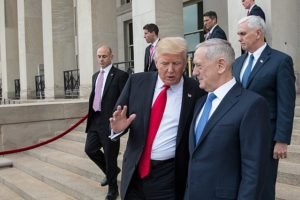Mattis: No ‘Smoking Gun’ in murder of Saudi journalist Khashoggi
By Josh Yasmeh
Defense Secretary Jim Mattis says many American political leaders and the media have jumped the gun in blaming Saudi Arabia’s Crown Prince for the October murder of dissident journalist Jamal Khashoggi.
“Right now, we do not have a smoking gun that the Crown Prince was involved,” Mattis said Saturday.
Mattis was echoing the views of President Trump and Secretary of State Mike Pompeo in his speech at the National Defense Forum at the Reagan Library in Simi Valley, California. They are downplaying the CIA’s assessment that Saudi Crown Prince Mohammad bin Salman ordered the murder of Khashoggi, who was critical of the Saudi regime in columns he wrote for the Washington Post.
The remarks just days after the Senate passed a bipartisan resolution calling for the United States to suspend military support of the Saudi-led coalition in Yemen.
Khashoggi entered the Saudi consulate in Istanbul on October 2nd, 2018 to get divorce papers that would allow him to marry his Turkish fiancée. He was never seen again. After initially denying any involvement in his disappearance, the Saudi government eventually admitted involvement in his murder and the subsequent dismemberment of the body.
The Washington Post has reported that the CIA believes that Mohammad bin Salman, often known by the initial “MbS”, ordered the assassination. But President Trump disputed that account last month, saying that the CIA report does not say specifically that MbS ordered the attack.
On Saturday, Mattis suggested that further investigation was necessary to determine what exactly happened to Khashoggi.
“We need to explore all aspects of the murder,” Mattis said.

Mattis also echoed Trump in arguing that crime should not define U.S.-Saudi relations. “Accountability of the murder of Khashoggi stands alone” from the administration’s other policy considerations, namely its national security interests and bilateral arms sales relationships.
Emphasizing Iran’s disruptive in the Middle East, Mattis asserted the importance of advancing a robust U.S.-Saudi partnership to counter emerging threats from the region’s preeminent Shiite power, including potential threats from nuclear proliferation and proxy warfare. This includes continued support for Saudi Arabia’s proxy war in Yemen.
To date, an ongoing war in Yemen has killed thousands of civilians as a result of a nearly three-year-long bombing campaign. The death toll is a consequence of direct civilian casualties from bombings in addition to cholera outbreaks, starvation, and other natural disasters incurred during wartime. The United States provides nearly 60% of Saudi Arabia’s armaments.
Even the president’s staunchest allies, however, joined the call in condemning Saudi Arabia for what’s seen as reckless behavior by the young Prince Salman. Following Trump’s dismissive comments regarding whether or not the Crown Prince had a hand in the assassination of Khashoggi, Sen. Lindsey Graham (R-SC) voted in favor of the Senate resolution after signaling that he would cast a vote against it. “I changed my mind because I’m pissed,” said Graham.
Source: American Media Institute




